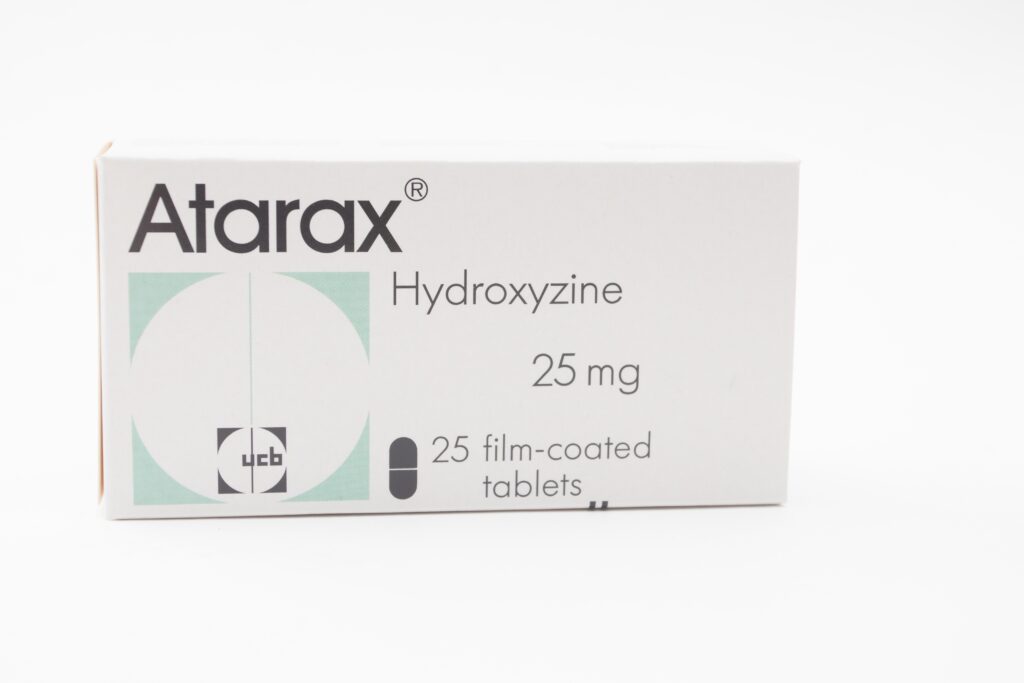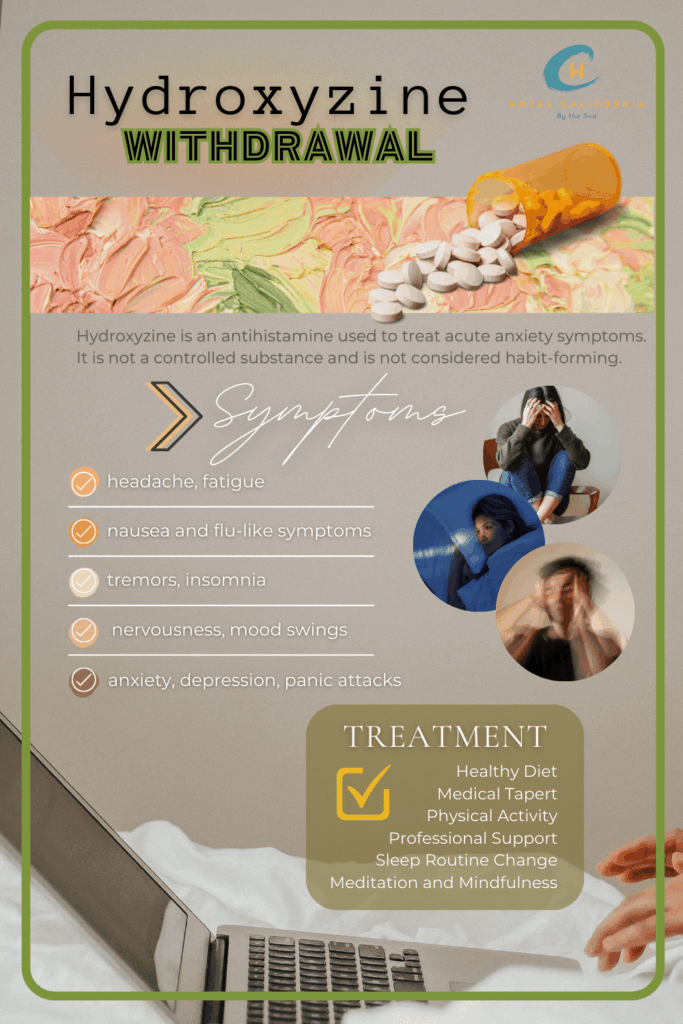Hydroxyzine Withdrawal: Can Antihistamines be Abused?
First-generation antihistamines like hydroxyzine impact the central nervous system and, in rare cases, can cause dependence and hydroxyzine withdrawal. In 2021, an estimated 11 million hydroxyzine prescriptions were issued in the US. It is a drug considered low in the potential for addiction and abuse with minimal withdrawal side effects. However, new research has raised a few questions about the additive potential and safety of the medication due to its direct impact on the central nervous system.

The antihistamine medication can treat acute symptoms in a similar way to medications like Xanax and Ativan treat symptoms. It is prescribed for short-term use.
Hydroxyzine is not a controlled substance and is not considered habit-forming. However, when taken at high doses, it can lead to drug dependence and abuse. It can cause depressant effects on the central nervous system, contributing to anxiolytic and sedative effects. It is best not to go cold turkey off the medication in order to avoid hydroxyzine withdrawal symptoms.
Hydroxyzine: A first-generation Antihistamine
Brand names of hydroxyzine include Vistrail, Atarax and Qiana. Hydroxyzine is commonly prescribed in the treatment of allergic conditions, anxiety and as a sedative. It can produce similar effects to those of opioids and benzos with very little risk of abuse.
The drug also has a long history of being prescribed for the treatment of alcohol withdrawal symptoms. For many years, it was believed to be effective in managing symptoms of alcohol withdrawal.
Common side effects of hydroxyzine include dry mouth, blurred vision, constipation, upset stomach, headache, confusion, nausea and weight gain. It can also enhance the sedative effects of other central nervous system depressants if used concurrently.
Before 1960, hydroxyzine was recognized as the standard of treatment for alcohol withdrawal because of its ability to reduce several common symptoms. It could target feelings of anxiety, shaking and insomnia.
Today, it has been replaced with benzos. This is because hydroxyzine cannot treat all of the alcohol withdrawal symptoms. In alcohol withdrawal, the brain is highly sensitive to an increase in glutamate. Sobriety triggers an increase in the chemical and the brain struggles to cope with the changes. Hydroxyzine fails to help the brain with this issue.

How does it work?
Hydroxyzine was approved back in 1957 and works by blocking the effects of histamine in the body. Hydroxyzine is prescribed to help with the following conditions:
- Managing anxiety – It is commonly used to help manage generalized anxiety disorder and reduce symptoms such as worry, restlessness and muscle tension. It can also be used as a premedication before medical procedures to help reduce feelings of anxiety and nausea.
- Relieving allergy symptoms – It is a histamine blocker. Histamine is a chemical reaction in the body that causes itchiness, hives and swelling. Hydroxyzine works to relieve skin reactions, rashes and that itchiness you feel when you have an allergic reaction.
- Sleep promotion – It is a mild sedative that can help aid in falling asleep and staying asleep. However, it should only be used as short-term management for sleep conditions like insomnia.
- Motion sickness – It can help prevent or reduce symptoms of nausea and vomiting associated with motion sickness.
Check Your Insurance Coverage for FREE
Find out if your insurance covers addiction treatment in minutes. We accept most insurance!
Risks of Drug Dependence and Hydroxyzine Withdrawal
Despite the low likelihood of abuse and addiction, hydroxyzine can cause drug tolerance and dependence. It doesn’t produce a physical dependence. When the medication is abruptly discontinued after long-term use, it can lead to a reemergence of symptoms such as anxiety and insomnia, which can worsen.
Hydroxyzine doesn’t produce a euphoric high so it is not likely to lead to drug-seeking behaviors. But for those who have used the medication for a long period of time, abrupt cessation of the medication can lead to withdrawal symptoms.
Withdrawal symptoms are often fairly mild compared to withdrawing from other more potent and addictive medications. Symptoms include headache, nausea, tremors, insomnia, fatigue, anxiety, nervousness, mood swings, depression, panic attacks and flu-like symptoms.
There are many factors that impact withdrawal duration and severity. Withdrawal can begin within 24-48 hours after the last dose of medication. On average, hydroxyzine withdrawal can last anywhere from a few days to about a week. The dosage of medication, the length in which medication was used, individual metabolism and diet, age of patient and the use of other medications can impact withdrawal.
In rare cases, a condition called delusional infestation (DI) can occur and causes a person to falsely believe they are infested with a parasite or insect despite running tests that say otherwise. It is a very rare withdrawal side effect and usually only occurs with long-term hydroxyzine use.
Signs of Hydroxyzine Abuse and Addiction
- Taking more of the drug than prescribed
- Taking the drug for reasons other than what it is prescribed for
- Taking the drug without a prescription
- Experiencing extreme sedation
- Experiencing excessive drowsiness and dizziness
- Experiencing nausea and vomiting
- Impaired motor function
- Restlessness, trembling or shaking
- Experiencing seizures
- Experiencing confusion
- Experiencing skin reactions, redness and swelling
How to manage and reduce Hydroxyzine Withdrawal symptoms
Cessation of a drug or a change of dosage can occur for many reasons. Some people find they need to switch to a different medication because the current one is not as effective. Some people find they are encountering unwanted side effects. And some people may simply want to stop taking traditional medications and find other ways to manage their symptoms. Whatever the case, abruptly stopping or changing medication can cause the development of withdrawal. Especially in hydroxyzine.
There are a few ways to help effectively manage and lessen the severity of withdrawal.
- Medical taper – Gradually tapering down in dosage of hydroxyzine can help lessen the severity of withdrawal symptoms. Slowly reducing the dose over time can help the body to adjust more appropriately.
- Managing symptoms – Engaging in deep breathing exercises, mindfulness and meditation can help manage anxiety symptoms.
- Sleep routine – Creating and maintaining a good sleep routine by going to bed at the same time every night, reducing or eliminating screen time and engaging in calming activities before bed can help treat symptoms of insomnia.
- Healthy diet – Staying hydrated and maintaining a healthy diet can help lessen withdrawal symptoms. This means reducing sugar, caffeine and highly processed foods.
- Physical activity – Staying active and exercising helps keep the body in good shape and able to better endure any physical withdrawal symptoms.
- Seek professional support – Seeing a therapist or counselor to help manage emotions can be helpful.
- Support Group – Participating and turning to a group of peers who might also be experiencing the same situations as you can make you feel less alone and motivate you to push through difficult withdrawal.
Reach out to Hotel California by the Sea
We specialize in treating addiction and other co-occurring disorders, such as PTSD. Our Admissions specialists are available to walk you through the best options for treating your addiction.
Treatment for Substance Use Disorder
Hydroxyzine is generally not considered to be addictive. It is not considered to be habit-forming. Because of this low risk, it is often considered a safe option for the treatment of anxiety. It can help induce feelings of calm and sleepiness. But it is only prescribed for short-term use.
When taken for a long period of time and at a high dose, the antihistamine medication can be abused and cause withdrawal symptoms. The sedative effects directly impact the central nervous system, making withdrawal symptoms more dangerous if not properly treated.
Professional behavioral health programs like Hotel California by the Sea provide treatment for those with dependence on central nervous system depressants like hydroxyzine. We offer treatment at all levels of care including detox, residential, PHP and IOP. We utilize evidence-based methods such as CBT, DBT and family therapy. Hotel California by The Sea is dedicated to helping clients reach their goals in sobriety and overcome their addiction.
References:
https://addictionresource.com/drugs/hydroxyzine
https://recovered.org/prescriptio n-drugs/hydroxyzine/controlled-substance-status
https://revivalmentalhealth.com/blog/hydroxyzine-withdrawal-symptoms
https://www.rehab4alcoholism.com/resources/withdrawal-alcohol-hydroxyzine
https://www.talkspace.com/blog/hydroxyzine-withdrawal/
https://www.singlecare.com/blog/is-hydroxyzine-addictive/
